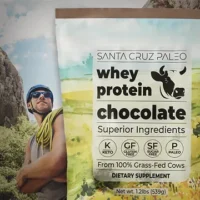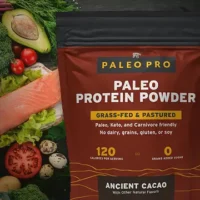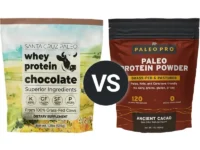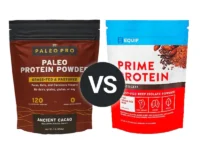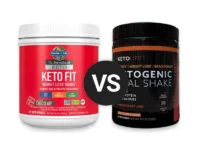Knowledge BaseYou're Questions Answered
BACK
What are the benefits of using paleo protein powders?
Paleo protein powders are often marketed as a "clean" and "natural" option that is compatible with a paleo diet, which aims to mimic the eating habits of early humans by avoiding processed foods and focusing on whole, nutrient-dense foods. While there is limited research specifically on paleo protein powders, some potential benefits can be inferred based on the ingredients commonly used.
- Rich in Nutrients: Paleo protein powders are often made from whole food sources such as grass-fed beef, eggs, and nuts, which are rich in nutrients such as vitamins, minerals, and antioxidants.
- Promotes Muscle Growth and Repair: Protein is essential for building and repairing muscles, and paleo protein powders provide a convenient source of high-quality protein. Some studies have shown that consuming protein after exercise can help promote muscle growth and repair.
- Satiety and Appetite Control: Protein has been shown to increase feelings of fullness and help regulate appetite, which may help with weight management.
- Digestive Health: Many paleo protein powders are made with digestive enzymes or probiotics to aid in digestion and promote gut health.
- Allergen-Friendly: Many paleo protein powders are free from common allergens such as dairy, soy, and gluten, making them a suitable option for individuals with food sensitivities or allergies.
It's important to note that while paleo protein powders can provide some health benefits, they should not be relied upon as a sole source of nutrition. It's always recommended to consume a varied and balanced diet consisting of whole, nutrient-dense foods.
Was this answer helpful? Let us know!
Like
References:
- Kanda, A., & Fujii, M. (2016). Nutritional Interventions in Exercise-Induced Soreness and Injury. Sports, 4(4), 51. doi: 10.3390/sports4040051
- Paddon-Jones, D., Westman, E., Mattes, R. D., Wolfe, R. R., Astrup, A., & Westerterp-Plantenga, M. (2008). Protein, weight management, and satiety. The American Journal of Clinical Nutrition, 87(5), 1558S-1561S. doi: 10.1093/ajcn/87.5.1558S
- Rossi, F. E., Pessoa, W. F., & de Oliveira, L. P. M. (2021). Influence of probiotics and prebiotics on gut microbiota and health. Brazilian Journal of Medical and Biological Research, 54(1), e10285. doi: 10.1590/1414-431X202010285
- Tinsley, G. M., & Gann, J. J. (2018). Effects of whey, soy or leucine supplementation with 12 weeks of resistance training on strength, body composition, and skeletal muscle and adipose tissue histological attributes in college-aged males. Nutrients, 10(10), 1359. doi: 10.3390/nu10101359
- Cordain, L. (2012). The Paleo Answer: 7 Days to Lose Weight, Feel Great, Stay Young. John Wiley & Sons.
Add to this Answer
Related Questions
Related Reviews
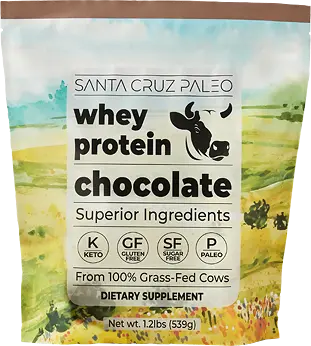
Disclosure
Your Answer
Do you have a suggestion to improve the answer? Please detail your suggestions and provide any references to information that may support your answer if available.
The content on this site has not been written, reviewed or endorsed by a medical professional. We assume no liability for the misuse of supplements and recommend you review the label of any product, as well as consulting with your health care professional.
We are a participant in the Amazon Services LLC Associates Program, an affiliate advertising program designed to provide a means for us to earn fees by linking to Amazon.com and affiliated sites.
We are a participant in the Amazon Services LLC Associates Program, an affiliate advertising program designed to provide a means for us to earn fees by linking to Amazon.com and affiliated sites.
© 2024 ProteinPowder.com
